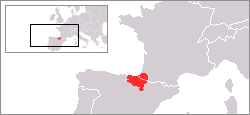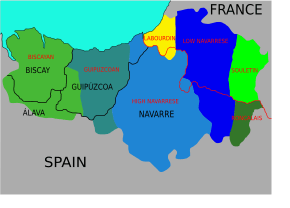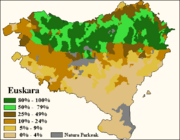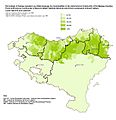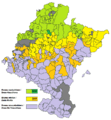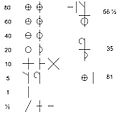Basque language facts for kids
Quick facts for kids Basque |
|
|---|---|
| Euskara | |
| Native to | Spain, France |
| Region | Spanish Basque Country Spanish Navarre French Basque Country |
| Ethnicity | Basque |
| Native speakers | 715,000 (2012) |
| Language family | |
| Early forms: |
Proto-Basque
|
| Writing system | Latin (Basque alphabet) |
| Official status | |
| Official language in | Basque Country Navarre |
| Regulated by | Euskaltzaindia |
| Linguasphere | 40-AAA-a |
Basque (Basque: Euskara) is a unique language spoken by the Basque people. They live in a region called the Basque Country, which is located in parts of Spain and France. Many Basque speakers also live in other countries around the world.
What makes Basque special is that it's a language isolate. This means it's not related to any other language family in the world, including the Indo-European languages spoken by most other Europeans. It's like a language that stands all by itself!
Contents
History of Basque
The Basque people are thought to be some of the oldest groups living in Europe. Their exact origins, and the origins of their language, are still a mystery. Many experts have tried to connect Basque to other ancient languages, but most agree it's a language isolate.
Basque was spoken long before the Romans came to the Iberian Peninsula (where Spain and Portugal are today). The Romans brought their language, Latin, which later became Spanish and French. But Basque managed to survive!
Where Basque is Spoken
Basque is spoken in a specific area within the larger region known as the Basque Country (Basque: Euskal Herria). In the past, Basque was spoken in an even wider area. However, over time, Latin and later Romance languages (like Spanish and French) became more common in some places.
Official Status
Today, Basque has a special official status in certain parts of Spain. It is an official language alongside Spanish in the Basque Country and in some areas of Navarre. This means it's used in government, schools, and public life.
However, in the Northern Basque area of France, Basque does not have official status. French is the only official language there.
Different Ways of Speaking (Dialects)
Just like English has different accents and ways of speaking, Basque has several main dialects. These are different versions of the language spoken in various regions. There are six main dialects:
- Biscayan
- Guipuzcoan
- High Navarrese (these three are in Spain)
- Low Navarrese
- Labourdin
- Souletin (these three are in France)
These dialect areas don't always match the political borders between Spain and France.
Unified Basque (Batua)
To make it easier for everyone to learn and use Basque, a unified version was created. It's called Batua, which means "unified" in Basque. Batua is now the standard language taught in schools and used in media. It is mostly based on the Gipuzkoan regional dialect.
How Basque Grammar Works
Basque grammar is known for being quite complex. It uses a system called ergative-absolutive language. This means that the way words change depends on whether they are the "doer" of an action or the "receiver" of an action. Nouns also have many different cases, which are like different endings that show their role in a sentence.
The vowel sounds in Basque are simple, similar to those in Spanish. There are five main vowel sounds.
Basque Words
Over many centuries, Basque has borrowed words from nearby languages. These include Latin, Spanish, French, and Gascon. However, it has borrowed fewer words compared to other European languages.
Some words that seem native to Basque actually came from Latin a long time ago. For example:
- lore (meaning "flower") came from the Latin word florem.
- errota (meaning "mill") came from rotam (which meant "[mill] wheel").
- gela (meaning "room") came from cellam.
The sounds of these words changed so much over time that they now sound completely Basque!
Writing System
Basque is written using the Latin alphabet, just like English. It has a few special letters:
- ñ: This letter is pronounced like the "ny" sound in "onion."
- ç and ü: These are also used in some words.
The letters c, q, v, w, y are generally not part of the Basque alphabet. They are only used for words borrowed from other languages. Also, the letter x in Basque is pronounced like "sh" in "shine."
Sample Phrases
Here are some useful phrases in Basque:
- Bai = Yes
- Ez = No
- Kaixo! = Hello
- Agur!, Adio! = Goodbye!
- Ikusi arte = See you!
- Eskerrik asko! = Thank you!
- Egun on = Good morning (literally: Good day)
- Egun on, bai = Standard reply to Egun on
- Arratsalde on = Good evening
- Gabon = Good night
- Mesedez = Please
- Barkatu = Excuse (me)
- Aizu! = Listen! (Used with friends to get attention)
- Kafe hutsa nahi nuke = Can I have a coffee?
- Kafe ebakia nahi nuke = Can I have a macchiato?
- Kafesnea nahi nuke = Can I have a café latte?
- Garagardoa nahi nuke = Can I have a beer?
- Komunak = Toilets
- Komuna, non dago? = Where are the toilets?
- Non dago tren-geltokia? = Where is the train station?
- Non dago autobus-geltokia? = Where is the bus station?
- Ba al da hotelik hemen inguruan? = Where is the (nearest, only) hotel?
- Zorionak = Happy holidays (During Christmas and New Year's), congratulations
- Ez dakit euskaraz = I do not speak Basque
- Ba al dakizu ingelesez? = Do you speak English?
- Nongoa zara? = Where are you from?
- Non dago...? = Where is...?
- Badakizu euskaraz? = Do you speak Basque?
- Bai ote? = Really?
- Topa! = Cheers!
- Hementxe! = Over / right here!
- Geldi! = Stop
- Lasai = Take it easy
- Ez dut nahi = I do not want
Images for kids
-
Lines in an exercise book given as punishment during Franco's regime. The line says "En la escuela no tengo que hablar vasco" (meaning "I will not speak in Basque at school").
See also
 In Spanish: Euskera para niños
In Spanish: Euskera para niños
 | James Van Der Zee |
 | Alma Thomas |
 | Ellis Wilson |
 | Margaret Taylor-Burroughs |


